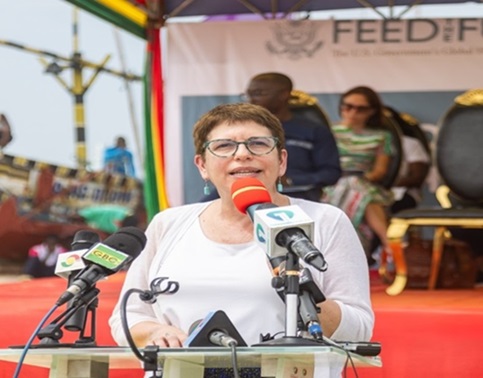USAID, Ministry of Fisheries mark successful end of closed fishing season
The U.S. Government, through the United States Agency for International Development (USAID), partnered with the Ministry of Fisheries and Aquaculture Development and the Fisheries Commission to mark the conclusion of the 2024 closed fishing season. This initiative aims to replenish fish stocks and ensure sustainable fishing practices in Ghana.
The closed season is a crucial period during which fishing activities are halted to allow fish populations to recover. This practice protects young and pregnant fish from fishing pressure, giving them the chance to rest and spawn. Additionally, it provides fishermen with the opportunity to mend their equipment and prepare for future expeditions.
USAID/Ghana Acting Mission Director, Grace Lang, emphasized the significance of the closed season. She highlighted that USAID supports sustainable fishing practices because of their importance in replenishing Ghana’s fish stocks. Fish are a vital source of food, nutrients, and livelihoods for millions of Ghanaians.
The biological impact assessment of the 2023 closed fishing season revealed positive outcomes. There was an increase in the average sizes of round sardinella, flat sardinella, and anchovies compared to before the closed season commenced. This suggests that during the closed period, fish populations had the opportunity to recover from the pressures of fishing activity, leading to a rebound in their size.

The United States stands as Ghana’s largest development partner. In 2023, bilateral support from USAID amounted to over $140 million, which was dedicated to various sectors including agriculture and economic growth, health, education, and governance.
One significant USAID initiative is the Feed the Future Ghana Fisheries Recovery Activity, which provides $24 million (over 355 million Ghana Cedis) in multi-year investments aimed at restoring Ghana’s coastal fisheries and improving ocean conservation along the coast. This program supports interventions such as the closed fishing season, a moratorium on new canoe entrants, electronic monitoring systems in the trawl sector, and the implementation of ministerial directives on trawl gear.
Furthermore, USAID has played a pivotal role in establishing regional co-management committees and local landing beach enforcement committees. These bodies ensure the participation of fishers in management decisions that affect their lives and livelihoods, fostering a collaborative approach to sustainable fisheries management.
The end of the 2024 closed fishing season marks a significant step towards sustainable fisheries in Ghana. Through continued collaboration and support, USAID and the Ghanaian government aim to ensure the long-term health and productivity of the country’s vital fish stocks.
